World Diabetes Foundation
Challenging the food culture of the Marshall Islands
Civil Society Working Group
26 May 2026
Movendi International | 03 Jul 2025
The World Health Organisation’s new “3 by 35” Initiative urges governments to raise the real prices of alcohol, tobacco, and sugary drinks by at least 50% by 2035. Backed by Movendi International and other global partners, the initiative aims to prevent 50 million premature deaths, generate $1 trillion in revenue, and reduce harm from noncommunicable diseases.
Evidence from countries like Sri Lanka and Lithuania shows alcohol tax increases lower deaths and boost revenue. Despite alcohol industry opposition, research confirms taxes reduce population-level alcohol consumption, harms, and costs while unlocking revenue and returns on investment. The initiative marks a major step forward in global alcohol policy and offers a roadmap for health and development.
The World Health Organisation has unveiled an ambitious initiative supporting countries to raise real prices on tobacco, alcohol, and sugary drinks by at least 50% through pro-health taxes by 2035.
The campaign, titled the “3 by 35 Initiative”, aims to prevent 50 million premature deaths, generate $1 trillion in public revenue, and reduce the global burden of noncommunicable diseases (NCDs).
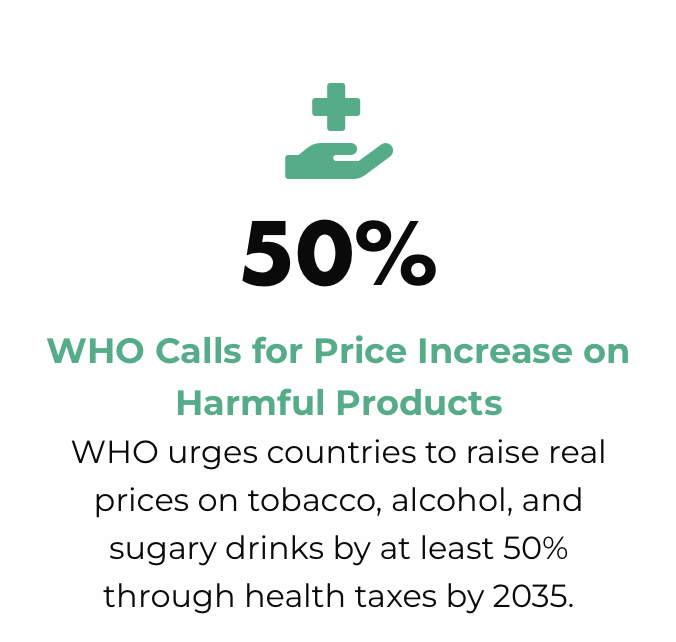
This initiative comes at a time when health systems around the world face mounting challenges from rising NCDs, shrinking development aid, and increasing public debt, according to WHO’s official news release.
Alcohol remains a major risk factor for NCDs, including heart disease, cancer, and liver disease, as well as mental health conditions.
WHO emphasises that raising alcohol taxes is one of the most effective tools to reduce population-level alcohol use, harms, and costs.
For instance, the WHO Global Alcohol Status Report highlights that despite recent mortality declines, alcohol use still causes over 2.6 million deaths annually.
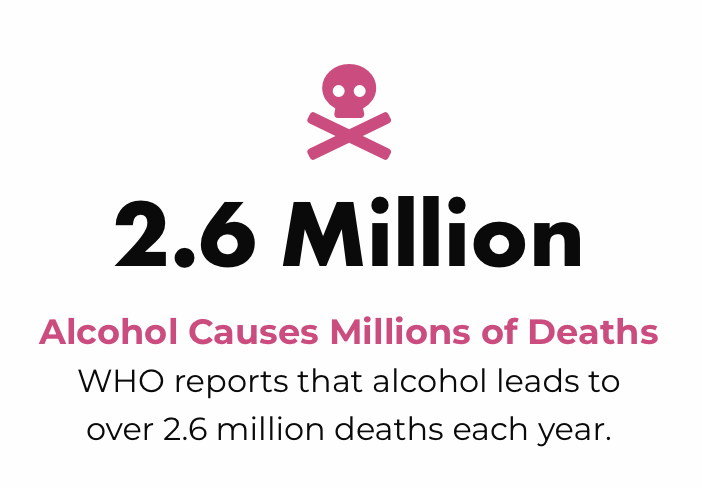
A growing number of countries have already introduced successful pro-health tax measures. From 2012 to 2022, nearly 140 countries raised tobacco taxes, with average real price increases exceeding 50%, WHO reported. This track record shows that substantial alcohol tax increases are not only possible but impactful. The 3×35 Initiative seeks to expand this approach in more countries, supporting them in adopting evidence-based alcohol taxation to repeat the successes of countries that have already raised alcohol excise taxes.
The economic and health benefits of raising alcohol taxes are already evident in countries like Sri Lanka and Lithuania.
Movendi International, a global alcohol policy advocacy organisation, reported that Sri Lanka surpassed its tax revenue targets in Q1 2024 after implementing two 20% alcohol tax increases in 2023.
Lithuania’s 2017 alcohol tax increase delivered a 22% drop in alcohol deaths and a 38% rise in alcohol tax revenue. The economic return was significant: for every €1 invested in the alcohol tax increase, the country gained €420 in economic benefits.
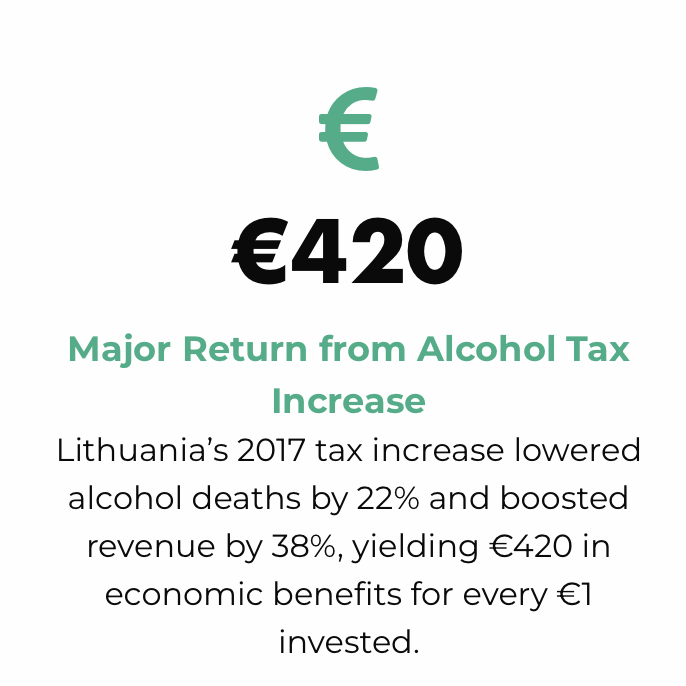
Further evaluations in Botswana, South Africa, Russia, Thailand, and the Philippines show similar gains. Movendi’s April 2024 policy brief, featuring eight case studies, details how higher alcohol taxes improve public health outcomes, bolster public finances, and reduce health inequalities.
Despite clear evidence of the impact and benefits for people’s health and nations’ development, the alcohol industry continues to resist pro-health taxes. According to drinks intel, the Distilled Spirits Council of the United States (Discus) called WHO’s recommendations “misguided” and wrongly claimed taxes would not deter people with alcohol use disorder. However, scientific studies cited by the WHO show the opposite.
Moreover, Discus’s senior VP of science & research, Amanda Berger falsely claimed that alcohol taxes fuel the informal alcohol market. However, research shows that higher taxes do not increase illicit sales, suggesting that the industry’s claims are aimed at protecting profit, not people’s health.
South Africa: Alcohol Tax Increases Work, As Science Exposes Industry Lies
The 3 by 35 Initiative is supported by a coalition of global actors including the World Bank, OECD, Bloomberg Philanthropies, NCD Alliance, SEATCA, and Movendi International. These partners bring technical support, policy advice, and advocacy experience to help governments design and implement pro-health tax reforms.
This initiative aligns with growing interest among countries to transition toward more self-reliant, domestically funded health systems. It also builds momentum toward the Fourth UN High-Level Meeting on NCDs in September 2025, where global leaders are expected to endorse taxation as a tool for sustainable development.
The “3 by 35” Initiative introduces key action areas to help countries, pairing proven health policies with best practices on implementation. These include direct support for country-led reforms with the following goals in mind:
WHO is calling on countries, civil society, and development partners to support the “3 by 35” Initiative and commit to smarter, fairer taxation that protects health and accelerates progress toward the Sustainable Development Goals.
Movendi International welcomes the 3×35 Initiative and we call on countries to follow best practice examples in raising alcohol taxes to protect people from preventable harm, promote health, support national development, and strengthen economies,” said Kristina Sperkova, International President, and Pubudu Sumanasekara, International Vice President of Movendi International.
We see that a growing number of countries is interested in raising alcohol excise taxes and is asking for support. We also see that people and communities support raising alcohol taxes because they want change concerning the high levels of alcohol harm. And we see that there are excellent country examples from around the world that show the impressive benefits of raising alcohol taxes.
Kristina Sperkova and Pubudu Sumanasekara, Movendi International
WHO’s 3 by 35 Initiative marks a turning point in global alcohol policy. With ample evidence of its effectiveness and growing public support, raising alcohol taxes is a proven strategy for preventing harm and promoting health equity.
Movendi International’s Vice President Pubudu Sumanasekara noted that with proper investment and communication, these measures can accelerate progress on 15 of the 17 Sustainable Development Goals.
Movendi International has developed three resources to support countries and build capacity for civil society advocacy towards raising alcohol taxes. With each resource comes a picture and together the three pictures illustrate the potential of raising alcohol taxes.
Alcohol taxation is more than a fiscal policy – it’s a powerful, proven tool for transforming societies. While often framed as a win-win or triple win, the full potential of raising alcohol excise taxation is best captured in its quadruple win:
Communities have long advocated for the use of alcohol taxation as a high-impact, cost-effective tool for domestic resource mobilisation. The potential of alcohol taxation to do good is substantial:
For instance, a global study estimated that increasing alcohol taxes globally by just 20% could generate additional revenue over US$ 9.4 trillion over 50 years – resources that could be used to fund healthcare, education, and social protection.
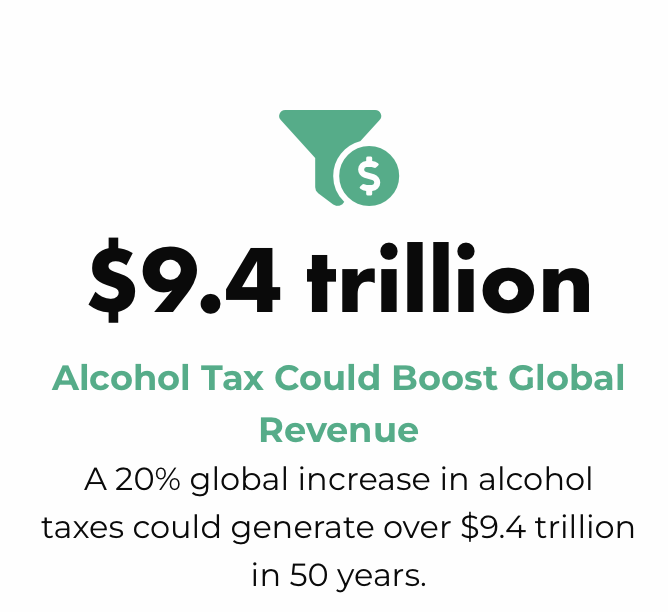
In 2024, the Task Force on Fiscal Policy for Health released a landmark report, “Health Taxes: A Compelling Policy for the Crises of Today.” It illustrates the significant potential of raising pro-health taxes for saving lives and it shows that raising alcohol taxes has the biggest potential for revenue generation. to invest in programs and services for people.
The Copenhagen Consensus Center released a landmark study in 2023. It identified 30 cost-effective interventions to achieve the SDGs in the fastest way possible. Analysis showed that the alcohol policy best buys in general and alcohol taxation on its own ranked second and third most effective out of all 30 interventions.
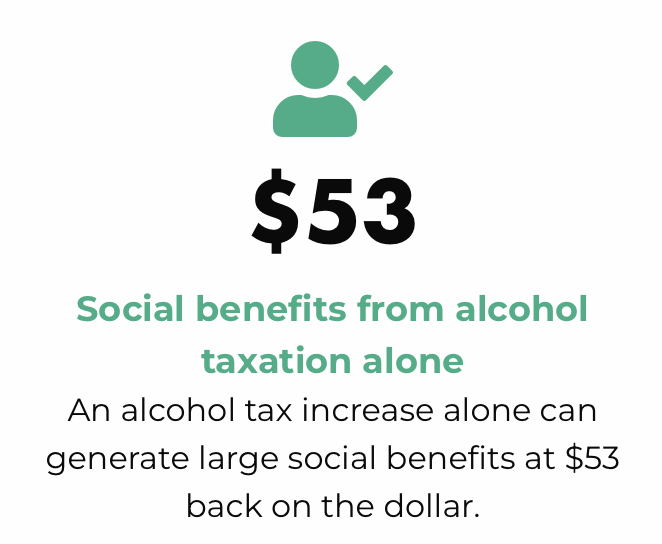
Implementing the alcohol policy best buys could prevent 150,000 deaths caused by alcohol in the next ten years. For every dollar spent on alcohol taxation alone, a country could generate social benefits worth $53.
With these resources and support from Movendi International, the RESET Alcohol Initiative, and the new 3×35 WHO-led Initiative, countries worldwide now have both the roadmap and the momentum to take evidence-based, ambitious action. Implementing pro-health taxes is a matter of saving lives and of building stronger, more equitable societies where everyone can thrive.